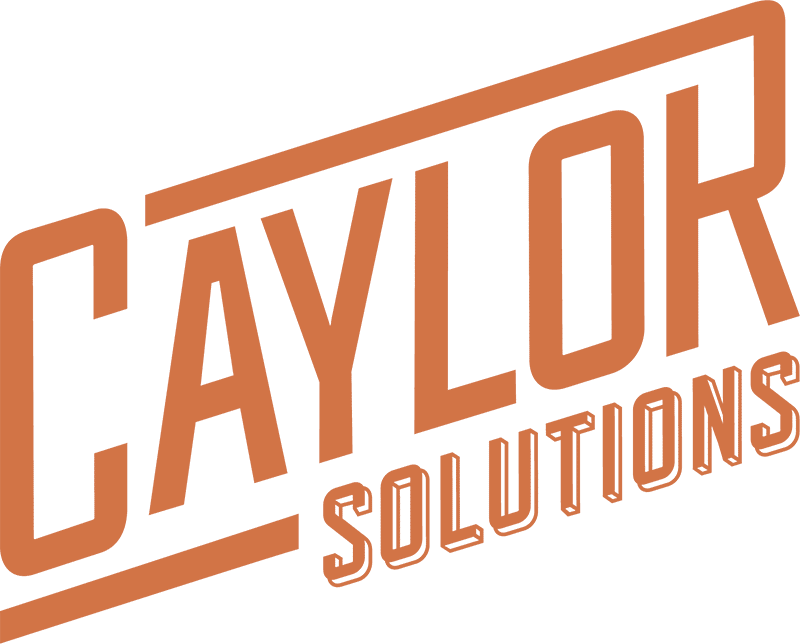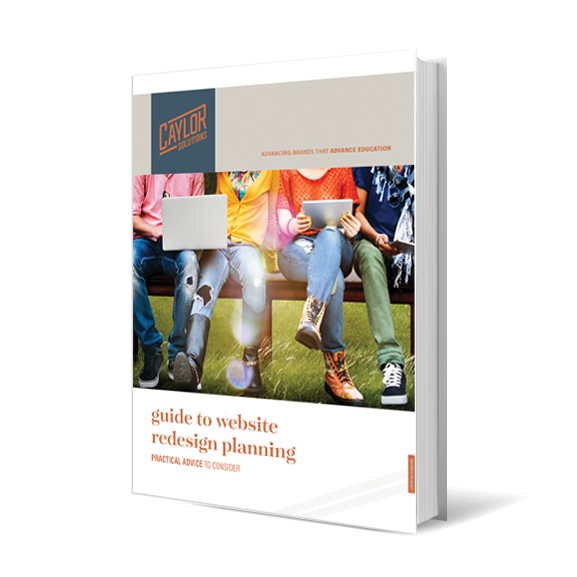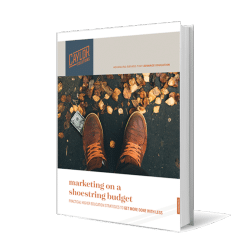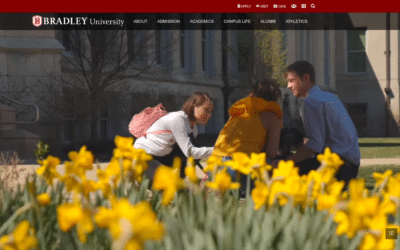When we say “enrollment marketing,” we often are referring to traditional student marketing. But don’t forget to include a strong plan for marketing your adult and graduate studies programs in your enrollment marketing efforts!
It’s fairly easy to find information out there about marketing to traditional students.
Honestly, there’s a lot of crossover in how you cultivate traditional students for your school and in marketing adult and graduate studies.
However, in my experience, there are a few things to keep in mind if you want greater success in this area.
Here is a list of seven essentials I’ve learned about marketing adult and graduate studies.
1. Fully Embrace Online Studies
Online programs tend to be regulated to the marketing back burner when it comes to enrollment marketing strategies.
But just a look at the data will tell you that this way of thinking needs to be turned upside down.
The popularity of online study programs is a fast-rising trend that shows no signs of going away.
As recently as the fall 2019 semester, over 50 percent of American postsecondary students enrolled in at least one online course.
Today, about three-quarters of undergraduate students are nontraditional, and the age range of that group encompasses multiple generations.
- More than 85 percent of American college students live off-campus
- As of 2017, 43 percent of full-time students were also employed
- Nearly half of new students are over the age of 25
- About 20 percent of students are parents
Bottom line…
You’ve got to fully commit to promoting, branding, and developing your online studies if you want to grow your nontraditional student enrollment numbers.
In other words, marketing adult and graduate studies successfully means promoting and improving your online studies experience constantly.
2. Identify Your Target Audience’s Goals
Overall, content for nontraditional students should be infused with objective data and specific benefits and distinctives that align with their life or career goals.
Your content should include the reasons to enroll rather than just facts and course listings.
Focusing on the unique brand benefits and communicating clear and concise distinctives will provide the discerning adult student information unique to your program.
- How will your program help them further their career?
- How will it help them improve their lifestyle? (Grow their family, attain their lifestyle goals, etc.)
- How will it help them achieve greater levels of success in their field or industry?
- Will this degree help them make a career switch?
These questions help guide your content to answer the real questions your audience has.
The Chronicle of Higher Education published a great article about the goals of most adult learners in this article.
Nearly half of American adults without college degrees think they need additional education to advance their careers — and just over half said they will likely pursue that education in the next five years.
It is a good thing for colleges and universities that adults are seeking additional education.
But in the article, the authors point out that…
…too many policy makers and practitioners have paid too little attention to what actually motivates individuals to pursue additional education.
In other words, we need to identify the goals of adult and graduate students.
Here’s some direction offered by the survey referenced in The Chronicle of Higher Education article.
Survey respondents said that guaranteed career boosts, affordable options, and flexibility would increase their likelihood of enrolling in more education.
Keeping these goals in mind, content marketing adult and graduate studies should focus on the “career boosting” aspects of your program.
Better put, how is this going to change their lifestyle, family, and work life for the better?
In regards to affordability, it’s important to put this into perspective.
The cost of furthering their education is an investment, not a cost never to be recuperated.
Publishing content that shows these attributes (career furthering, affordability, and flexibility) is more likely to attract nontraditional and graduate students.
3. Educate Your Audience
Because marketing adult and graduate studies is a “non-traditional” path, it means most students don’t know where to start.
To help guide them in this sometimes scary journey, offer unique content that gives the adult student information about what is required and needed to go back to school.
By providing this basic education resource, your school will be a value-added option from day one.
These elements should permeate all communications…from collateral to websites, and should include clear calls-to-action for ads that provide a link to a website landing page that is concise and to the point to take the prospect to the next step.
4. Content Marketing for Adult and Graduate Studies
Going back to school or pursuing a higher degree is a major investment of time and money, both of which most adult students have little of.
A steady stream of strategic content will help your audience see the value of your higher degree program and encourage them to make the decision to enroll.
- Identify goals for content and how it fits toward the enrollment of the student.
- All content should be “sales” oriented and focused on taking the user to the next level in the student journey (funnel).
- Be specific and clear. Clearly state the information and use numbers and data effectively.
- Create content maps to help you plan out your content creation over time.
- Keep headlines and content simple, scannable, and compelling. Use headlines that promise to answer their pressing questions like “7 Tips to Success,” “10 Time Management Tools,” etc.
- Commit to consistency and a common voice across all media.
- Review all content for SEO opportunities.
- Leverage various media and “memes” including text, video, audio, photos, infographics, charts, graphs, etc.
5. Sell the Experience, Not Just the Practicalities
Marketing adult and graduate studies tends to produce extremely practical kinds of messaging.
This is natural because many nontraditional adult students are more concerned about the benefits of the degree for their career and lifestyle goals than having a college experience.
Still, this doesn’t mean you can’t show the intangible or experiential benefits of your in-person, online, or higher degree programs.
In our podcast conversation with Shauna Davis and Mary Laphen of The Lumina Foundation, they stress the importance of aspirational branding, even for practical audiences like nontraditional students.
When you look at how people are choosing education, it’s largely based on what they think about that education.
Your brand is largely perception. What do people think about you?
We really wanted colleges to tap into understanding better who the community thinks they are, not just who they [as an institution] think they are.
[Then we wanted them to] see if there’s an alignment there, or if there’s work to be done so that the community understands the great things about community colleges, not only what’s practical.
While adult students will be looking for a practical program that fits their very practical needs, it’s important to share the great experience they can have in your adult and graduate studies program.
- What’s it like to be a nontraditional student in your school?
- What’s it like to be a part of a class of other adult learners?
- What are the experiences or testimonies of other nontraditional students?
- What does it feel like to graduate from your program and be among the alumni?
6. Go to the Watering Holes
One of the most profitable things you can do in marketing adult and graduate studies is to find the watering holes where your target audience is already hanging out.
In our podcast episode with Kevin Bish, VP of Enrollment Management and Student Services at Asbury Theological Seminary, he shares about the difficulty in identifying mission-fit students for their graduate school.
It’s a real struggle for us. Just because someone graduates from an undergraduate institution with a degree doesn’t mean they’re necessarily looking at theological education.
In my prior life, when I was working in the undergraduate world, it was great to be able to buy a list and look at SAT scores and put different marketing programming together. But the challenge [in graduate enrollment marketing] is really trying to find [prospective students].
So Kevin and his team rely on the watering hole where potential seminary students are hanging out — church denominations within their tradition.
Denominational support is one way we [identify prospective students]. We work with a lot of different denominations. Matter of fact, Asbury serves around 88 different denominations. We work a lot with denomination leaders [who] know and have their eye on certain individuals that are likely to come to seminary.
By going back to this watering hole, they can keep meeting new potential students who are very likely to be mission-fit for their program.
7. User-Generated Content
Content developed for prospective adult students has to happen beyond the marketing department.
Look to professors, employers, mentors, and alumni to assist in developing testimonials, stories, and valuable resources.
I’ve also found it helpful to look for ways to create content that will be conversation starters and harvest the content for marketing purposes.
With the proper content strategy, you can establish marketing materials that will help drive inquiries leading to more applications from nontraditional students.
For more help on marketing adult and graduate studies, please contact us today!
Looking for Enrollment Marketing Content that Works?
You’re in luck! We’ve curated 25 awesome ideas inspired by top higher ed institutions across the country and put them in one handy guide: 25 Ideas for Great Admissions Content. 
-
- 25 enrollment marketing content ideas you might never have considered before
- Guidance on how to use each one for best results
- Brief discussion on why they work to help you sell these ideas to your team
Get inspired.
Get enrollment results.
Get 25 Ideas for Great Admissions Content.
Download your copy today!
Featured image by Pressmaster via Adobe Stock












